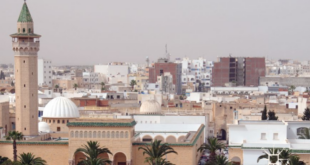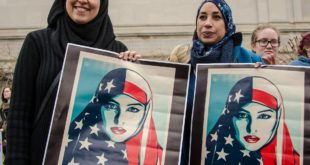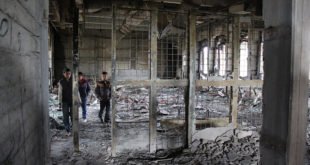TBS: In the short time since its launch, how far has Dubai Media City come towards its goal of becoming a regional satellite broadcasting hub?

Saeed Al-Muntafiq: We have the largest Middle East, pan-Arab broadcaster, MBC, which has decided to relocate to Dubai Media City from London. We have Middle East Business News, producing for CNBC. Reuters has decided to relocate their operation and expand it in this region at Dubai Media City. One of our latest is CNN, which has confirmed that they will be operating out of Dubai Media City by the 2nd of January, doing two things: incorporating a regional news bureau here, and launching CNNArabic.com out of Dubai Media City. So if we just look at the kind of companies that we've been able to attract over the last nine months of our existence in terms of broadcasting, I think this shows how much we've established ourselves as a regional hub.
That's from a transmission perspective, which is just one side of broadcasting. The second side toward which we are focusing our efforts is content creation. I believe we still have a way to go in that area, but what's happened over the last nine months also demonstrates our success. We're not Lebanon, we're not Egypt, and we know what our strengths are and what our weaknesses are. Our focus in terms of content creation is primarily in the digital sense. We have the best technology infrastructure in the region here in the free zone. Our closeness to Dubai Internet City helps us to achieve that—the whole city is wired with fiber optic links. So in terms of creating content digitally, manipulating it digitally, post-producing it digitally, that's really where our focus is. With that in mind, we already have 150 thousand square feet of production studios, the construction of which will start in December, primarily focused toward digital. Secondly, we have attracted Sony, who are the big players in the supplying of equipment for that industry. Third, there's a TV channel located here in Dubai Media City, Zen TV, which also focuses on the digital platform and is only transmitting digitally.
With convergence being a reality, we also focus on publishing. This doesn't impact broadcasting right now because the industry isn't that mature in the Arab world, but we believe that will change. We have some of the largest pan-Arab publishers in the region located in Dubai Media City—including Saudi Research and Publishing Co., publishers of al-Sharq al-Awsat, al-Rajl, and others, which is the second largest in the world after Time-Warner. They relocated from Jeddah, and relocated three newspapers from London, they're uplinking and downlinking from here and printing in Dubai. We have ITP, which is the largest specialized magazine publisher in the region, with PC magazine, Digital Studio, and other publications.
Our vision is not to be a regional base for broadcasters, but to be one of four or five global bases for broadcasting as we move forward over the next few years. We're completing the last phase of building our teleport station, which will be ready in March of next year. This will be a full-fledged, fully integrated earth station allowing our broadcasters to uplink and downlink.
TBS: Has Dubai Media City announced its anticipated regulatory framework? In that framework, how do you balance between press freedoms on the one hand and political and cultural values on the other?
Al-Muntafiq: It's a highly sensitive subject, and because of that we've had to make sure that all the bases are covered. We looked at practices all over the world, including Singapore and the United Kingdom, and also the UN Declaration of Human Rights and the American laws and codes of ethics, to learn from them. What we have developed and are very close to launching is a few things: first, a code of ethics that every broadcaster will sign. These are broad guidelines taken from a combination of the best practices that I mentioned. The second thing is that our freedom of expression laws will be governed by the broadcasters themselves. We are guaranteeing freedom of expression to them, and are asking them to exercise censorship by themselves. We will not participate in that field, will not tell them what to show or what not to show, what time to show it or not. The broadcasters we're going after are the ones already being seen in the region, their product is already being seen in the region, and we'll ask them to continue doing what they do best, much better than we can do it. If they were to violate a person's privacy, or they violate a code, and an individual or entity has a complaint, we are setting up a tribunal which will be run by an independent body, as is done elsewhere in the world.
We've also established four 'no's: no pornography, no broadcasters owned by political parties, no preaching of religion other than Islam, and no defamatory content. We're going after the entertainment, variety, and leisure category of broadcasters, not the political aspect. We're a commercial organization and believe that's where the money is, and don't want to get involved in the other side.
TBS: When you talk to broadcasters who haven't moved in yet, what do you give them as being the technical, financial, and other advantages?
Al-Muntafiq: There's no set formula, because each one is unique and going to a different business market. There are platform providers, single channel broadcasters, people who are in the business for reasons other than commercial, and so on. Depending on who we talk to, we develop a separate business case to be able to attract them. From the research we've done over the last nine months there's one single common denominator that applies to all broadcasters, and that's freedom of expression. They all want to be free to develop their own content and broadcast it without any interference from governments or other entities. The second thing is that most if not all are losing money, and we had to understand why that is so. One of the reasons is that infrastructure is very costly, and each broadcaster went and invested heavily in their own infrastructure. Dubai has established itself for many years now as being good for business. We can show broadcasters that we are building 150 thousand square feet of production studios, so why should they build their own? We're building a teleport station, so why should they invest in the equipment?
The third thing we present is cost. The biggest cost to any broadcaster, besides infrastructure, is people. That's not just salaries but also housing, cars, schooling, etc. Dubai on average is cheaper than London, cheaper than Rome, Hong Kong, Cairo or Beirut when you look at quality of life. We did a case for MBC which showed that MBC as a company was saving money by moving here, but also the employee himself was saving money.
TBS: You've created a base of operations for freelance journalists who must legally have a sponsor. This is obviously advantageous to the journalists, who would otherwise have no way of working in Dubai. How is the arrangement also advantageous to Dubai Media City?
Al-Muntafiq: This project has been probably the most successful in the history of Dubai Media City. His Highness Sheikh Mohammed came up with the idea about a year ago when we were talking to him about the broadcast industry and how it operates, and the components of the value proposition we need to present. A key component for broadcasters is cost and people. With that in mind, the use of freelancers all over the world reduces the cost for broadcasters in terms of content creation. That industry in the UAE is unavailable. So we were mandated to create an industry for freelancers. We launched 150 open units that we lease to individuals at a price of 19,000 dirhams a year, about $3,500. For that you get a trade license, resident visa, desk, phone, computer, and business services like a shared secretary. Within two months we sold out. We have producers, journalists, music artists, writers, from all over the Arab world and outside. We're now converting two floors—we underestimated the success of it.
The other thing that has happened in that area is that we've seen, for example, four freelancers sitting next to each other, one of them a music producer, another a TV producer, another a journalist, and another a presenter. They formed a company, and are moving in to the Phase Two buildings of Dubai Media City. It's a community. This is the kind of networking that knowledge economies are all about. They're talking to each other and realizing that one has money, one has skill, one has an idea—access to capital, access to ideas, access to talent creates economies. That's what we have here.
TBS: There's another venture here, Dubai Ideas Oasis. How is this related?
Al-Muntafiq: This has a mandate to be the venture capital and incubation arm of the government, to catalyze Internet startups and e-commerce businesses from the region. From Aug. 1 we moved into a reevaluation and an upgrading of the project, which should be launched the second week of November.
TBS: Sheikh Mohammed announced a few days ago cooperation between Dubai Media City and the American University in Dubai, in a program that would give students training and offer them jobs after graduation. There's also been talk of creating a media institute within Dubai Media City, in cooperation with other local universities. What is the status of these plans, and how will it impact your broadcasters?
Al-Muntafiq: Dubai Media City and Dubai as a whole is very serious about His Highness's vision of moving Dubai into a knowledge economy within a very short time. He's convinced you can't do that without doing a few things: upgrading the skills of UAE nationals, of people who live in the UAE, and of the people in the region. Second, you have to attract capital. These two major components need particular systems and particular processes and education platforms. We had to develop strategic programs, and also to realize that this is a journey; you can't upgrade the skills of a nation overnight, and you have to struggle with change. But we've seen success. This discussion between Dubai Media City and AUD has been ongoing, about how they will contribute and how we will contribute. They're right next door. The formalizing of this relationship has taken place and that relationship will now progress.
Dubai Media City's focus towards creation of a platform of education for the media has started with the following initiatives. The first is the Ibda'a Awards, which encourages young talent. Also, we will soon be launching a concept approved by His Highness called Knowledge Village. This is 650 thousand square feet, just in front of the Crown Prince's palace, about half a mile from Dubai Media City. Inside that will be the Dubai Media Academy, the Dubai IT Academy. Companies who are experts in their fields will take space there. Reuters, for example, will teach about journalism. CNN will teach about digital content creation, Sony will teach production. Rahbani, a big playwright and author, will teach about theater. In the IT sector, IBM, Microsoft, and others will teach. AUD will focus on long-term education, a two- or four-year degree; we'll focus on short-term training.
TBS: We see a lot about Dubai Media City in Dubai business publications, but very little beyond Dubai. Have you considered reaching out beyond the UAE area in terms of public relations, considering the importance of inward investment?
Al-Muntafiq: That's very important. Dubai Media City is only nine months old, and we've had to concentrate limited manpower on building the organization, and we've done that. From January 2002 everything is in place for media planning that will form the essence of our brand going global, because we have to do that. This market is too small for us. From January on you'll see an aggressive campaign that will last 18 to 24 months for positioning Dubai Media City to help it achieve its vision of becoming global, and more importantly, in cooperation with organizations like the Dubai Tourism and Promotion Board, in encouraging inward investment into Dubai in specific industries that fit within our own vision and direction.
TBS: There's a global crisis right now—it's impact on Dubai may be limited, but do you think it will be a setback to what you're doing, or do you think it's relatively irrelevant?
Al-Muntafiq: It may be a setback, but I don't think it's one that will affect us too greatly. That's the spirit of Dubai and the future of Dubai. Twenty-six years ago, just after the 1973 war, His Highness the late Sheikh Rashid opened three mega projects on the same day—Jebel Ali Port, Dubai Drydocks, and the Dubai World Trade Center. Everybody in the region and all the press asked him the same question: the Middle East just came out of a big war, and you're opening the largest man-made port in the world? The rest is history. It's the same with what the Crown Prince is doing now. Dubai is safe, and business is as usual.
 Arab Media & Society The Arab Media Hub
Arab Media & Society The Arab Media Hub




